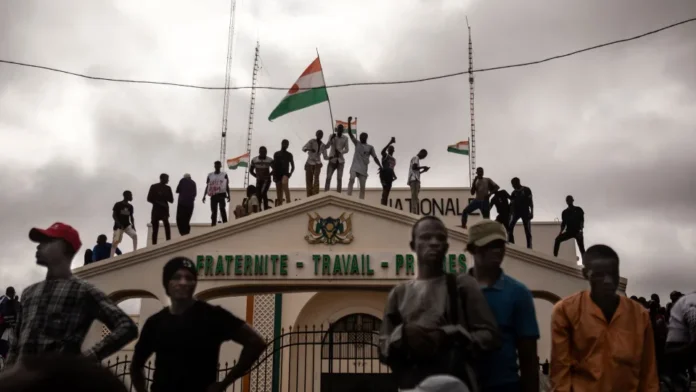The African Union’s Suspension of Niger: A Deep Dive into the Political Dynamics
In a dramatic turn of events, the African Union (AU) has taken a decisive stance against the recent military junta takeover in Niger, a West African nation with a history of political turbulence and democratic struggles. The AU, a collective of 55 member states, has made an impactful announcement that reflects its commitment to upholding constitutional order and democratic values across the continent. This article delves into the specifics of the AU’s suspension of Niger, exploring the political background, international response, and the implications of this significant move.
The African Union’s Stance: A Reflection of Democratic Values
In an anticipated statement that reverberated across diplomatic circles, the African Union declared the immediate suspension of the Republic of Niger from all its activities, organs, and institutions. This suspension is to remain in place until the restoration of constitutional order within the country. The AU’s Peace and Security Council convened on August 14 to discuss the military coup that transpired on July 26. This swift and unequivocal response demonstrates the AU’s unwavering commitment to safeguarding democratic principles and the rule of law.
The Background: Unraveling the Military Coup
To understand the AU’s suspension decision, it’s crucial to delve into the circumstances that led to the military junta’s takeover in Niger. On July 26, the country witnessed a sudden shift in power as a military coup ousted President Mohamed Bazoum. The subsequent unrest and uncertainty prompted the AU to act swiftly, concerned about the implications of this coup for the nation’s stability and democratic progress.
International Response: Unity and Solidarity
The AU’s response to the military coup was not isolated. The organization called upon both its member states and the global community to reject the unconstitutional change of government and refrain from legitimizing the junta. This call to action underscores the importance of global unity in upholding democratic norms. Additionally, the AU extended its support to the Economic Community of West African States (ECOWAS), a regional bloc, in its efforts to address the crisis.
ECOWAS’s Ultimatum and Diplomatic Efforts
ECOWAS, a prominent regional player, initially issued a stern ultimatum to the junta, demanding the restoration of power within seven days or facing severe consequences, including military intervention. However, dialogue and diplomacy took precedence, as ECOWAS, the United States, and the European Union engaged in multiple rounds of talks to find a peaceful resolution. Despite the delay in military action, the bloc reiterated its readiness to intervene if necessary.
The Turning Point: ECOWAS’s Firm Stand
In a significant development, ECOWAS’s Commissioner for Political Affairs, Peace & Security, Abdel-Fatau Musah, emphasized the bloc’s determination to prioritize restoring constitutional order in Niger. The Commissioner’s assertive stance signals ECOWAS’s preparedness to use military intervention as a means to achieve this goal. This turning point showcases the region’s commitment to democratic ideals and its refusal to engage in endless dialogue with the junta.
AU’s Solidarity and Call for Constitutional Order
The African Union’s suspension decision is underpinned by its solidarity with ECOWAS’s diplomatic efforts. The AU urged the military junta to prioritize the interests of Niger’s people and promptly return to civilian authorities in line with the nation’s constitution. This call for adherence to democratic norms resonates with the AU’s core values and highlights its commitment to upholding the rule of law.
Junta’s Proposed Transition and Future Scenarios
In a surprising move, General Abdourahamane Tchiani, the military ruler who led the coup, proposed a return to democracy within three years. While the junta’s intentions might be seen as an attempt to pacify domestic and international concerns, the AU and its partners remain cautious. The junta’s offer for a transitional period will be scrutinized in the coming weeks during a national dialogue. The specifics of this transition will be crucial in determining the nation’s political trajectory.
Conclusion: The Path Forward
The African Union’s suspension of Niger following the military junta’s takeover underscores the significance of democratic principles in the continent’s governance landscape. The AU’s resolute stance, coupled with ECOWAS’s assertive diplomacy, sends a clear message that political upheaval and unconstitutional power grabs will not be tolerated. As Niger navigates its transitional period, the international community’s vigilance will remain essential in ensuring the nation’s return to democratic governance.








[…] The African Union’s Suspension of Niger: A Deep Dive into the Political Dynamics […]